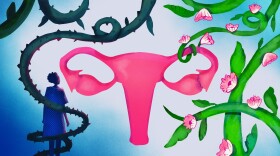
Nell Greenfieldboyce
Nell Greenfieldboyce is a NPR science correspondent.
With reporting focused on general science, NASA, and the intersection between technology and society, Greenfieldboyce has been on the science desk's technology beat since she joined NPR in 2005.
In that time Greenfieldboyce has reported on topics including the narwhals in Greenland, the ending of the space shuttle program, and the reasons why independent truckers don't want electronic tracking in their cabs.
Much of Greenfieldboyce's reporting reflects an interest in discovering how applied science and technology connects with people and culture. She has worked on stories spanning issues such as pet cloning, gene therapy, ballistics, and federal regulation of new technology.
Prior to NPR, Greenfieldboyce spent a decade working in print, mostly magazines including U.S. News & World Report and New Scientist.
A graduate of Johns Hopkins, earning her Bachelor's of Arts degree in social sciences and a Master's of Arts degree in science writing, Greenfieldboyce taught science writing for four years at the university. She was honored for her talents with the Evert Clark/Seth Payne Award for Young Science Journalists.
-
A recurring leak of liquid hydrogen fuel forced NASA on Saturday to postpone a scheduled launch for the second time this week. The earliest possible launch date is Sept. 19.
-
A 30-year, nationwide study of ecological changes — including the effects of climate warming — has been releasing a powerful greenhouse gas, and critics want it to stop.
-
Health, Science & EnvironmentIn the week since the first images from the James Webb Space Telescope were unveiled, astronomers have been poring through all the observations it's made so far--and they're happily overwhelmed.
-
Doctors say they're seeing a surge in the number of women who want their "tubes tied." But hospital capacity, paperwork, religion and personal opinion are just some of the reasons requests get denied.
-
The largest bacteria known to science have been discovered in the Caribbean. They're visible to the naked eye and surprisingly complex.
-
An isolated population of polar bears in southeast Greenland has learned to hunt on freshwater glacier ice. That means they may be able to survive longer as climate change makes sea ice scarce.
-
The amount of resources devoted to studying gun violence is paltry compared to its public health impact. Still, the evidence shows certain policies might help prevent mass shootings.
-
The rate of U.S. gun homicides jumped nearly 35% in 2020 to the highest level in more than 25 years. And gaps widened for groups already at the highest risk, especially Black men and boys.
-
NASA and the European Space Agency are gearing up to bring home a pristine sample of Martian rock. But given the small chance of life on the red planet, they have to grapple with safety questions.
-
NASA should send probes to the ice giant planet of Uranus and to a moon of Saturn where conditions could be right for life. Those are some of the recommendations in a new report to the space agency.










